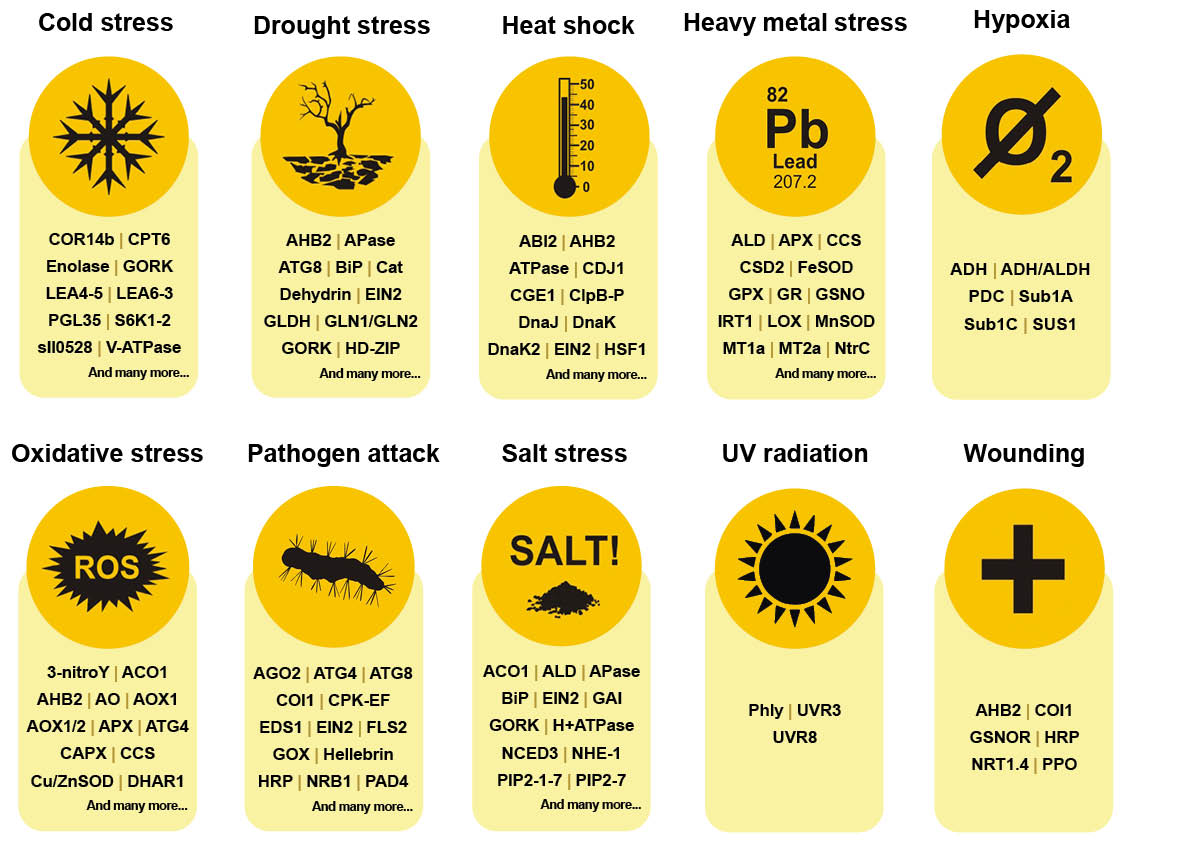As environmental conditions are changing, plants have to adapt to cope, as they, unlike animals, are stationary and cannot move to another location. Adaptive mechanisms help plants survive and thrive in challenging conditions and include:
These mechanisms collectively allow plants to adapt to their environment, and optimize their chances of survival in the face of various stressors. The specific strategies employed can vary depending on both the type of stress and the plant species involved. Agrisera's antibody collection to proteins involved in plant stress response has been developed over many years, in close collaboration with the scientific community. You can browse our full environmental stress antibody collection, which is discounted by 20% until end of March 2024. Use the discount code Stress20. |  |
Latest
Agrisera supports the EpiseedLink conference2026-02-13 Interview with Prof. Stefan Jansson
2026-02-04 Interview with Prof. Eva-Mari Aro
2026-01-21 Agrisera supported Western Photosynthesis Conference 2026
2026-01-18 The Global Plant Events Calendar is celebrating 7th anniversary
2026-01-16 Interview with Prof. Zofia Szweykowska-Kulinska
2026-01-12 Agrisera participates and supports several conferences in 2026
2025-12-29 Interview with Assoc. Prof. Nico Blanco
2025-12-23 2025 Highlights!
2025-12-22 We wish you all a wonderful holiday season and a bright start to 2026!
2025-12-19
Archive
- February - 2026
- January - 2026
- December - 2025
- November - 2025
- October - 2025
- September - 2025
- August - 2025
- July - 2025
- June - 2025
- May - 2025
- April - 2025
- March - 2025
- February - 2025
- January - 2025
- December - 2024
- November - 2024
- October - 2024
- September - 2024
- August - 2024
- July - 2024
- June - 2024
- May - 2024
- April - 2024
- March - 2024
- February - 2024
- January - 2024
- December - 2023
- November - 2023
- October - 2023
- September - 2023
- August - 2023
- July - 2023
- June - 2023
- May - 2023
- April - 2023
- March - 2023
- February - 2023
- January - 2023
- December - 2022
- November - 2022
- October - 2022
- September - 2022
- August - 2022
- July - 2022
- June - 2022
- May - 2022
- April - 2022
- March - 2022
- February - 2022
- January - 2022
- December - 2021
- November - 2021
- October - 2021
- September - 2021
- August - 2021
- July - 2021
- June - 2021
- May - 2021
- April - 2021
- March - 2021
- February - 2021
- January - 2021
- December - 2020
- November - 2020
- October - 2020
- September - 2020
- August - 2020
- July - 2020
- June - 2020
- May - 2020
- April - 2020
- March - 2020
- February - 2020
- January - 2020
- December - 2019
- November - 2019
- October - 2019
- September - 2019
- August - 2019
- July - 2019
- June - 2019
- May - 2019
- April - 2019
- March - 2019
- February - 2019
- January - 2019
- December - 2018
- November - 2018
- October - 2018
- September - 2018
- August - 2018
- July - 2018
- June - 2018
- May - 2018
- April - 2018
- March - 2018
- February - 2018
- January - 2018
- December - 2017
- November - 2017
- October - 2017
- September - 2017
- August - 2017
- July - 2017
- June - 2017
- April - 2017
- March - 2017
- February - 2017
- December - 2016
- November - 2016
- October - 2016
- September - 2016
- August - 2016
- July - 2016
- June - 2016
- May - 2016
- April - 2016
- March - 2016
- February - 2016
- January - 2016
- December - 2015
- November - 2015
- October - 2015
- September - 2015
- August - 2015
- July - 2015
- June - 2015
- May - 2015
- March - 2015
- February - 2015
- January - 2015
- December - 2014
- November - 2014
- October - 2014
- September - 2014
- August - 2014
- July - 2014
- June - 2014
- May - 2014
- April - 2014
- March - 2014
- February - 2014
- January - 2014
- December - 2013
- November - 2013
- September - 2013
- August - 2013
- July - 2013
- June - 2013
- May - 2013
- April - 2013
- February - 2013
- January - 2013
- December - 2012
- October - 2012
- September - 2012
- August - 2012
- July - 2012
- June - 2012
- May - 2012
- April - 2012
- March - 2012
- December - 2011
- November - 2011
- September - 2011
- August - 2011
- July - 2011
- April - 2011
- January - 2011
- December - 2010
- October - 2010
- September - 2010
- August - 2010
- July - 2010
- March - 2010
- January - 2010
- December - 2009
- November - 2009
- September - 2009
- July - 2009
- June - 2009
- May - 2009
- March - 2009
- January - 2009
- December - 2008
